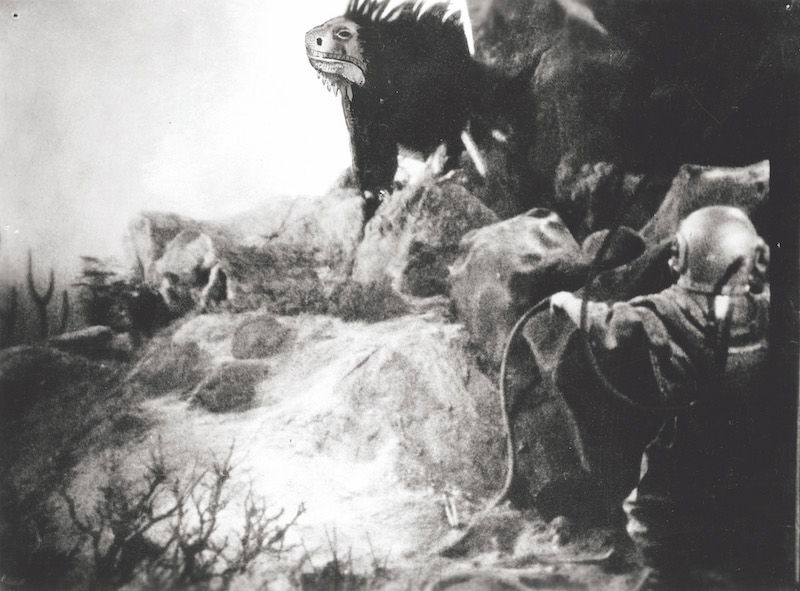On 19 October 1933 Daily Mail journalist Percy Cater wrote:
Whether people elsewhere believe in the existence of a Loch Ness ‘monster’ or not, Highlanders are convinced that the watery depths harbour some fantastic and abnormal creature.
Cater could have had no idea that just six months later his words would be reproduced in the opening title-card of a major new feature film. Premiering in May 1934, The Secret of the Loch was the first time that the ‘Loch Ness Monster’ had appeared on the big screen. The plot follows the eccentric Professor Heggie’s attempts to prove the monster’s existence and a pushy reporter’s pursuit of both the story and the professor’s granddaughter. It was not simply a horror film but a clear attempt to dramatise an unfolding story that had captivated the popular imagination in Britain ever since the first 20th-century claim that a ‘monster’ had been sighted at Loch Ness was reported in May 1933. Despite rational suggestions – everything from drifting logs to seals – the hysteria had taken hold. By December 1933 an official police order had been issued that the ‘monster’ was not to be attacked (even though local constables had seen no sign of a mysterious beast) and by the end of January 1934 children’s publisher Dean & Sons Ltd had begun selling the first cuddly toy version of the monster at Selfridges.
The phenomenon gave playwright and screenwriter Charles Bennett an idea. Bennett had already achieved success as the writer behind Alfred Hitchcock’s innovative first sound film Blackmail (1929), and he would later write further Hitchcock hits including The Man Who Knew Too Much (1934), The 39 Steps (1935), Secret Agent (1936) and Sabotage (1936). Recognising a good subject for a film, Bennett visited Loch Ness and gathered plenty of inspiration: a scene in The Secret of the Loch where a London reporter finds a crowd of monster-hunting journalists at the Loch’s local inn is taken directly from Bennett’s own experience. Location filming around Loch Ness further enhanced authenticity, while Bennett’s co-writer Billie Bristow (a journalist and cinema publicist with whom Bennett had previously collaborated) donned a diving suit as part of her research for the film’s underwater sequences.
As the Loch Ness craze developed, the press adopted a sarcastic tone that carefully balanced scepticism with the very faint possibility that the rumours might turn out to be true. This tone is reflected in Bennett and Bristow’s script, resulting in a comedic film that shifts abruptly into a thriller halfway through when a diver is killed while hunting for the monster. The film’s original working title, Sinister Deeps, embraced the horror genre but the final title captures the ambivalence of contemporary attitudes towards the phenomenon. Jokes in the film’s dialogue about alcohol-fuelled visions of the monster reflect genuine suspicions, while the depiction of sceptical scientists arguing in a museum’s dinosaur gallery dramatically exaggerates contemporary consultation with experts from institutions including the Royal Zoological Society of Scotland, London Zoo and the Natural History Museum.

To cultivate mystery, scenes featuring the ‘monster’ itself were filmed in secret at Ealing Studios using a live iguana rendered monstrously large via a combination of close-up photography, rear projection and a diver in a studio tank. The film’s official star, Seymour Hicks, described his reptilian co-star as ‘the most temperamental creature ever seen in a film studio’, adding that the production team ‘have exposed more miles of film on it than any star can ever hope to have’. Careful editing by a young David Lean ensured that the effects were convincing; director Ken Russell would later remember being so terrified by the sequence when he first saw it as a child that he ‘ran out of the cinema and didn’t stop running ’til I was over Cobden Bridge’, forgetting his coat in the process.
By casting an iguana, Bristow and Bennett were following a popular contemporary theory that the monster was a giant amphibian survivor from the Mesozoic era. Early cartoons of the monster tend to feature claws rather than flippers, a concept that was reinforced when film-maker and big-game hunter Marmaduke Wetherell ‘discovered’ large footprints at Loch Ness in December 1933 (these were later established to have been made with a hippopotamus foot). But the popular image of the monster changed forever when the so-called ‘Surgeon’s Photograph’ was published on 21 April 1934. Revealed in 1975 to have been faked by Wetherell, the photograph crystallised the monster’s image as a long-necked, smooth-skinned creature with a serpentine or plesiosaur-like form. By the time The Secret of the Loch was released in 1934 the design of the film’s monster was already out of kilter with public imagination.
Despite this, The Secret of the Loch enjoyed a glittering premiere with a ‘Monster Midnight Matinée’ in aid of the Dreadnought Hospital, Greenwich. This event included a charity auction of a ‘mystery monster, guaranteed to be alive and healthy’, but what precisely this was has sadly not been recorded. In 1936 home cinema distributor Pathéscope released a three-reel 9.5mm silent precis of the film and a more complete sound version was released in 1939, once Pathé had begun producing sound projectors. It remained available for purchase until the late 1940s. Ninety years have passed since the film’s premiere and the legend of the Loch Ness Monster has long outlived its first cinema treatment, but The Secret of the Loch offers a time-capsule glimpse of the moment when ‘Nessie’ entered the popular imagination.
Corrina Readioff is Honorary Research Fellow at the University of Liverpool.





